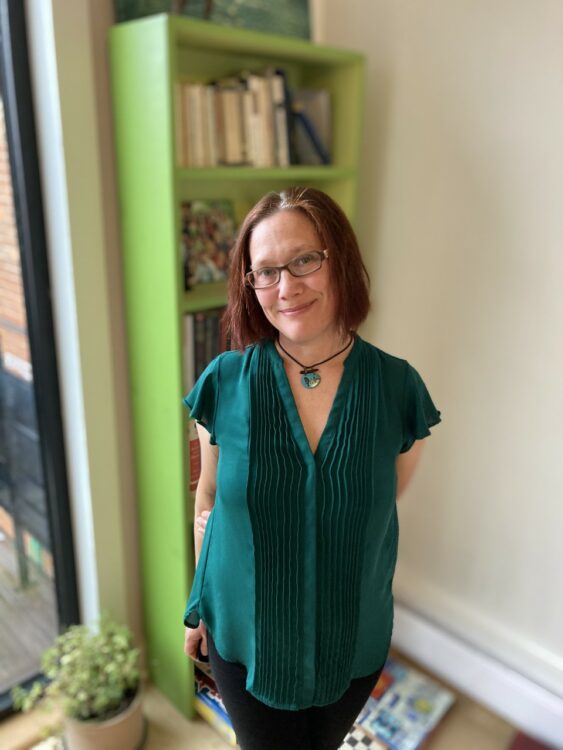Sarah Woolley, an Associate Professor in the Department of Biology, and her collaborators have earned a prestigious HFSP 2021 Program Grant worth $1 million USD over three years for their project Feathers as structures and sensors: Understanding mechanosensing in bird flight. The funding was awarded recently by the International Human Frontier Science Program Organization (IHFSP).

The HFSP selection process is highly competitive and Woolley’s was the top-ranked of 28 projects that received Program Grants. The HFSP is an international program of research support that aims are to promote intercontinental collaboration and training in cutting-edge, interdisciplinary research focused on the life sciences.
“HFSP’s collaborative research grants are given for a broad range of projects under the umbrella theme Complex mechanisms of living organisms,” said the HFSP press release. “The Program funds cutting-edge, risky projects and it is the only program that supports international teams of scientists with laboratories in different countries. HFSP Program Grants appeal to the innovative and creative potential of the research teams.”
Woolley is collaborating with Shane Windsor, of the Dept. of Aerospace Engineering at University of Bristol; and David Perkel, of the Dept. of Biology & Otolaryngology at the University of Washington.
For the Feathers as structures and sensors project, Woolley and her colleagues are studying how birds are able to sense airflow when they fly.
“Birds are very agile and robust flyers, they can cope with challenging or gusty wind conditions and perform really remarkable aerial manoeuvres,” says Woolley. “To do this, they take advantage of the flexibility of their feathers, which vibrate as air flows over them and stimulate the mechanosensory neurons in the skin. This provides birds with information about how their wings are moving through the air.
“So we think the ability of birds to sense airflow is critical for flight, but we know almost nothing about how the bird senses the air. In particular, how do changes to airflow get translated into feather movement, and then how is feather movement translated into neural signals so that the brain can create a sensory image of airflow over the wing,” she continues. “Our team for this HFSP grant will combine approaches from aerospace engineering, behavioral training, and neuroscience to study how airflow over the feathers is turned into signals in the brain, allowing birds to ‘feel’ their way through the air while they fly.”
New perspectives
The Feathers as structures and sensors project marks a departure from Woolley’s normal research focus. Her lab is primarily concerned with the study of neural circuits important for the production and perception of bird song.
“Songbirds perform learned songs for communication and females use the songs produced by males to recognize individuals and select mates,” she says. “My lab investigates how developmental and adult experiences, such as social interactions or early exposure to song, shape the way females perceive songs. We are especially interested in the role of dopamine in modulating the learning and plasticity of female song preferences.”
“The HFSP grant is completely new direction for us, which is really exciting. The grant is a unique form of funding that requires an international team of researchers to undertake a novel, high risk, high-reward direction of research,” says Woolley.
Woolley says one of the favourite parts of her job is finding creative ways to solve problems. “There’s a lot of tinkering of hardware and software involved in adapting systems that were built to study other animals to use them to study natural behaviours in birds. For this grant, I need to adapt those systems not just to study birds, but to study them in flight,” she says. “I now find myself spending a lot of time watching birds land on the feeder on my deck and thinking about what I need to build to be able to train birds to do that in the lab. It’s giving me a completely different perspective and focus when I see birds in flight.”
Lifelong interest in the natural world
Woolley comes by her interest in the natural world honestly.
“I grew up in Miami, Florida and spent a lot of time outside, curious about all of the crazy wildlife that was basically everywhere,” she says. “But it hadn’t really occurred to me that my interest in biology and animal behaviour could be career until relatively late in my undergraduate degree.”
In one class on neuroscience, a professor discussed his research on songbirds and how they learn their songs when they are young. “I found it fascinating,” remembers Woolley, who went on to work in the professor’s lab as an undergraduate.
While she did her PhD on the role of dopamine in courtship behaviour in lizards, Woolley was drawn back to songbirds as a postdoc. “I’ve been working to understand song production and perception ever since,” she says.
Guided by curiosity
When asked if she has any advice for students considering a career in science, Woolley says people should cultivate a strong support system and be unafraid to explore different paths.
“I think it’s key to build networks, of colleagues and mentors. Doing science can be full of risk and failure, so having support to help you think through a problem or encourage you when things get challenging is really important,” she says. “Also, there’s not one way to be a scientist, or one kind of science. For me, part of figuring out whether a career in science was the right fit involved much of the same kind of trial-and-error that I use for doing experiments. I tested out different ideas, projects, and approaches until I found one that really drove my curiosity.”

Congratulations, Dr. Woolley!!!
This is very exciting work! Congratulations!